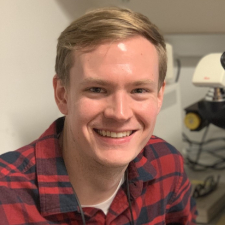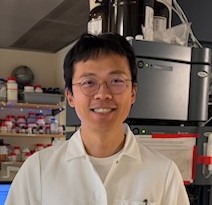In order to survive, cancer cells must evade or disable the immune system. Many cancers are caused by chronic infection with viruses that modulate the host cell by influencing gene expression to achieve this same goal. Dr. Pasquarelli [HHMI Fellow] is studying how viral proteins alter gene expression to create a tumor microenvironment that prevents the immune system from killing cancer cells. Since many viral proteins achieve this by changing the expression of secreted proteins, which can be therapeutically targeted, Dr. Pasquarelli is also exploring the effect of secreted proteins on tumor immune evasion. This work will deepen our understanding of how cancers evade the immune system and has the potential to uncover new targets for cancer treatment. Dr. Pasquarelli received her PhD from the University of California, Los Angeles, and her BS from Brown University, Providence.
Lung Cancer
Current Projects

Studies have shown that lung tumors are sustained through the formation of new blood vessels from pre-existing ones in a process called angiogenesis. Moreover, tumor cells secrete signaling proteins that help them communicate with each other and evade immune detection. However, most of these studies have been on late-stage lung tumors; our understanding of cell-cell interactions in the tumor environment during lung cancer initiation and early stages remains poor. Dr. Sengupta [Deborah J. Coleman Fellow] plans to identify the gene expression patterns in tumor cells, endothelial cells (blood-vessel-forming cells), and immune cells over time to understand how they engage in this cellular crosstalk, promoting tumorigenesis. She also plans to examine cell-cell interactions in early-stage lung cancer using organoids, or artificially grown miniature organs. This line of investigation will help understand the mechanisms underlying tumor initiation and lead to novel biomarkers that can help detect lung cancers earlier. The findings will also help identify novel therapeutic targets that can be inhibited to improve patient responses and survival. Dr. Sengupta received her PhD from Indian Institute of Science, Bangalore and her MS and BS from University of Calcutta, Kolkata.

Immunotherapy has significantly changed how lung cancer and melanoma are treated. Unfortunately, only a small percentage of patients experience long-lasting responses. Gut bacteria have emerged as a potential predictor of how patients will respond to immunotherapy and may even be adjusted to enhance the effect of immunotherapy. Dr. Shaikh aims to identify features of the gut microbiome that correlate with immunotherapy responses. She will focus on both individual bacteria as they change over the course of treatment and the metabolites made by the entire bacterial community in the colon. The goal of this project, since gut bacteria can be modified, is to develop microbiome-based treatments to be used in combination with immunotherapy to improve response rates or overcome immunotherapy resistance for patients.

Dr. Walter focuses on splicing factor genes, which carry out the RNA splicing process and are widely mutated in lung cancer. The splicing factor U2AF1 is mutated in 2% of lung cancer patients, but 80% of these mutations are identical, making it one of the most common missense mutations in lung cancer. Scientists do not have a good understanding of why this mutation occurs, or how it promotes cancer development. Dr. Walter will use a combination of cell and mouse model systems along with patient data to identify the unique molecular and genetic features of U2AF1-mutant cancer cells with the goal of identifying new therapeutic targets for lung cancer patients.

Dr. Zheng [Fayez Sarofim Fellow] is dedicated to the development of technologies for studying tumor evolution within their native contexts. Understanding the complex processes of cancer growth and progression requires a deep exploration of the dynamic interactions between tumor cells and the tumor microenvironment. “Spatial-omics” technologies are powerful tools that offer direct visualization of cells and their interactions in natural contexts, enabling systematic investigation of these intricate processes. Dr. Zheng aims to develop novel spatial-omics technologies that combine imaging and gene sequencing approaches to uncover the mechanisms underlying the spatially distinguished features of tumor evolution. Dr. Zheng received his PhD from Harvard University, Cambridge and his BS from Peking University, Beijing.

There are two key types of cancerous mutations: one that turns on growth signals too strongly, like a car with a stuck accelerator, and the other that turns off safety mechanisms, like a car with broken brakes. While some cancers can be treated with drugs that block overactive growth signals—such as Gleevec for chronic myeloid leukemia—there are currently no effective treatments for cancers caused by the loss of these safety mechanisms, also known as tumor suppressor genes. Notably, mutations in TP53, one of the most common tumor suppressor genes, are abundant in almost all cancers, including breast, lung, and ovarian cancers. Dr. Zheng’s research focuses on reactivating these impaired tumor suppressor genes, such as TP53 and FBXW7, to develop new treatment options for a wider range of cancers and to address resistance to existing therapies.







